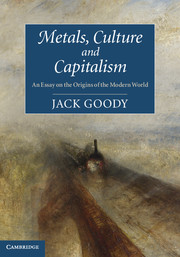Book contents
- Frontmatter
- Contents
- Maps
- Plates
- Preface
- Acknowledgements
- Chronology
- Part I Explorers
- Part II Merchants
- Part III Accumulators
- 11 Iron and the Industrial Revolution
- 12 Metals, ‘capitalism’ and the renaissances
- Appendix 1 The metallurgy of iron
- Appendix 2 Damascene steel and blades
- Glossary (with the aid of J. A. Charles)
- Bibliography
- Index
- Plate section
12 - Metals, ‘capitalism’ and the renaissances
Published online by Cambridge University Press: 05 June 2014
- Frontmatter
- Contents
- Maps
- Plates
- Preface
- Acknowledgements
- Chronology
- Part I Explorers
- Part II Merchants
- Part III Accumulators
- 11 Iron and the Industrial Revolution
- 12 Metals, ‘capitalism’ and the renaissances
- Appendix 1 The metallurgy of iron
- Appendix 2 Damascene steel and blades
- Glossary (with the aid of J. A. Charles)
- Bibliography
- Index
- Plate section
Summary
Although the proximate impetus for this book came from students from the east, some wearing their veils, I have always wanted to pursue the story of the Bronze Age in more recent times, perhaps ever since I was in the ‘Middle East’ during the Second World War and ‘discovered’ civilisations in Asia that existed much earlier than my own. The Bronze Age meant the development of urban life, not only of the metal plough and the spear, the sword and the axe but of writing, with a complete shift in the mode of communication. If this was not the beginning of scientific and cultural life, at least it gave those activities a great spur and eventually pointed the way to the modern world; if it was not the beginning of artistic activity, it represented the birthplace of many of those forms that we value today. In talking of the role of metals in this Bronze Age, I have never wanted to exclude the more ‘spiritual’ aspects of culture, so important for an anthropologist. But on the other hand I have never accepted a complete gap between the two. Libraries proceeded from writing; in Mesopotamia writing was at first developed for accounting. Our division between the material and the spiritual has always seemed to me a crude and primitive distinction related to that between the soul and the body which I had considered at some length when writing on LoDagaa funerary practices. There appeared to be little firm basis for this widespread dichotomy. The Bronze Age that was the effective beginning of the Age of Metals also produced the golden treasures of Ur.
At a similar level of abstraction, magic and science (or technology) have always been intertwined for me as with the Oceanic fishermen discussed by Malinowski, as with the Alchemists of the Islamic, European and indeed Chinese ‘Middle Ages’, as with Newton himself and perhaps even with Joseph Needham. It is true that with the later separation of these aspects, the advance of knowledge of the world proceeded more rapidly, but in the minds of most they are still intertwined. Nevertheless the long-term development of mankind did involve a certain separation, as it did with the arts and sciences. But earlier, among the LoDagaa, there was little discrimination between these activities, between powder for a gun and ‘medicine’ from a shrine.
- Type
- Chapter
- Information
- Metals, Culture and CapitalismAn Essay on the Origins of the Modern World, pp. 285 - 300Publisher: Cambridge University PressPrint publication year: 2012



